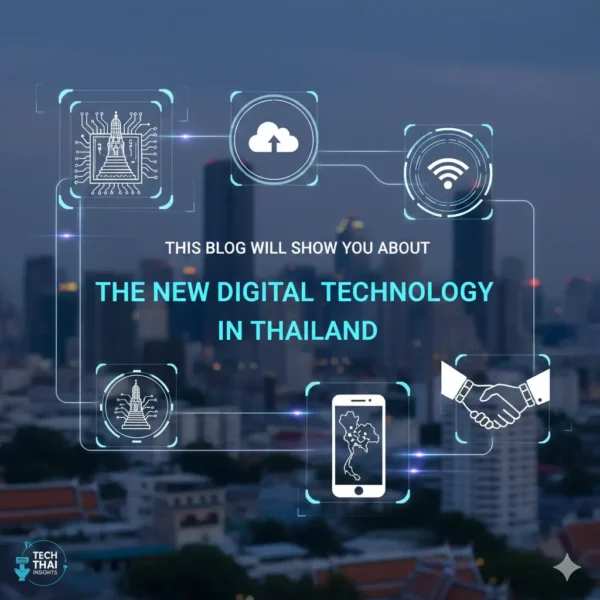This blog will show you about the new digital technology in Thailand. The year is 2025, and Thailand has become one of the top digital countries in Southeast Asia. Almost everyone uses the internet. Fast 5G is everywhere. People pay with phones instead of cash. Businesses grow quickly because of new tools. If you are a manager, a startup owner, an investor, a government worker, or a digital nomad, Thailand has something exciting for you.

Why Thailand Is Changing So Fast
Thailand started a big plan called “Thailand 4.0” many years ago. The plan said: let’s use technology to make the country richer and better. The government built fast internet and gave money to new tech companies. Then the COVID years came. Everyone had to shop, work, and study online. This made people love digital tools. Today, more than 94 out of every 100 Thais use the internet every day.
The Heart of Thailand Digital Transformation
Thailand’s digital transformation is easy to see in real life. Street food sellers scan QR codes for payment. Factories use robots that talk to each other. Big companies teach workers new digital skills and get big tax breaks. Small shops sell on Shopee and Lazada and reach customers all over the country. The government helps everyone join the digital world.
Hot Thailand Technology Trends Right Now
Five big trends lead the way in 2025:
- Thailand 5G technology – it is fast and covers almost the whole country.
- AI and smart chatbots – many companies use them to help customers.
- Cloud computers – businesses save money and work from anywhere.
- Phone payments – almost no one carries cash anymore.
- Smart farming – farmers use drones and sensors to grow more rice and fruit.
Smart City Technology in Thailand Makes Cities Better
Bangkok, Chiang Mai, Phuket, and many smaller cities are becoming smart. Street lights turn on only when needed. Traffic lights change when too many cars wait. Sensors tell workers when rubbish bins are full. Hospitals let patients check in with their phones. Tourists get safety warnings on the beach through apps. By 2027, Thailand wants 105 smart cities.
Fast Thai Tech Industry Growth
More than 1,000 tech startups work in Thailand today. Some are now unicorns – companies worth more than one billion dollars. Examples are Flash Express for delivery and Bitkub for crypto money. The government lets new ideas test fast in a safe “sandbox”. Big companies like Amazon Web Services are building huge data centres here.
Key Numbers of the Thailand Digital Economy in 2025
| What We Measure | Number in 2025 | Why It Matters |
| People using internet | 67.8 million (94.7 %) | Almost everyone is online |
| Mobile phone connections | 99.5 million | More phones than people |
| Money made by digital economy | $140 billion | Grows twice as fast as normal economy |
| Online shopping market | $19.28 billion | People love to buy on phones |
| Money moved by phone wallets | $18.64 billion | Cash is becoming rare |
| 5G coverage | 90 % of population | Fast internet even in villages |
Helpful Thai Government Digital Initiatives
The government wants every Thai person to feel the benefits. They made one digital ID for tax, hospital, and bank. They created the ThaID app – 35 million people already use it. Villages get free training to sell things online. Anyone can join free or very cheap classes to learn coding, AI, and digital marketing.
Easy Thailand Fintech Advancements
You can buy food, clothes, or bus tickets with your phone in seconds. PromptPay moved more than 51 trillion baht last year. New virtual banks will open soon and give higher interest with no fees. Tourists and nomads love it because they do not need a Thai bank account.
Safety tip: if an unknown number calls, check it first. Learn how here: Spotting and Reporting Phone Scams.
Why Digital Nomads Love Thailand in 2025
Remote workers from all over the world choose Thailand because1:
- 5G works on islands and mountains.
- Coffee shops have super-fast Wi-Fi.
- A special 10-year visa exists for remote workers.
- You never need cash – everything is on the phone.
- Living costs are low and the weather is warm.
Many nomads use virtual phone numbers to keep their real number private. Read the guide: Virtual Phone Numbers.
Thailand AI Adoption Is Growing Every Day
Big shops use AI to guess what you want to buy. Hospitals use AI to read X-ray pictures faster. Farmers use AI to know the best time to plant rice. Schools teach children how to use safe AI tools. The government wants Thailand to be in the top 50 countries for AI soon.
Thailand Tech Startups – The Future Is Bright
Young people start companies in fintech, health tech, travel tech, and green tech. The government gives money and free office space in Bangkok and the Eastern Economic Corridor. Global investors visit every month looking for the next big Thai unicorn2.
Frequently Asked Questions (FAQs)
Does 5G work all over Thailand in 2025?
Yes. 5G reaches more than 90 % of people. You get fast internet in cities, villages, and most islands.
Can tourists and nomads pay with phones easily?
Yes. Just show your passport and download an app. QR code payments work everywhere without a Thai bank account.
Is it a good time to invest in Thai tech startups?
Yes. Government help, tax breaks, and new data centres make it one of the best places in Southeast Asia right now.
Are there many phone scams in Thailand?
Some exist, but the government blocks bad calls fast. Use caller ID apps and stay safe.
In Conclusion
This blog showed you about the new digital technology in Thailand. From fast 5G to smart cities and easy phone payments, Thailand is now a true digital leader in Southeast Asia. Business leaders find new ways to grow. Startup founders get help and money. Digital nomads enjoy perfect internet and low costs. Government workers build smarter services. Everyone wins when technology is simple and useful.
The big question for you today is: How will you use Thailand’s new digital tools to make your work or life better this year?
Reference
- Digital 2025 Thailand report → https://datareportal.com/reports/digital-2025-thailand ↩︎
- Official DEPA website → https://www.depa.or.th/en/home ↩︎

